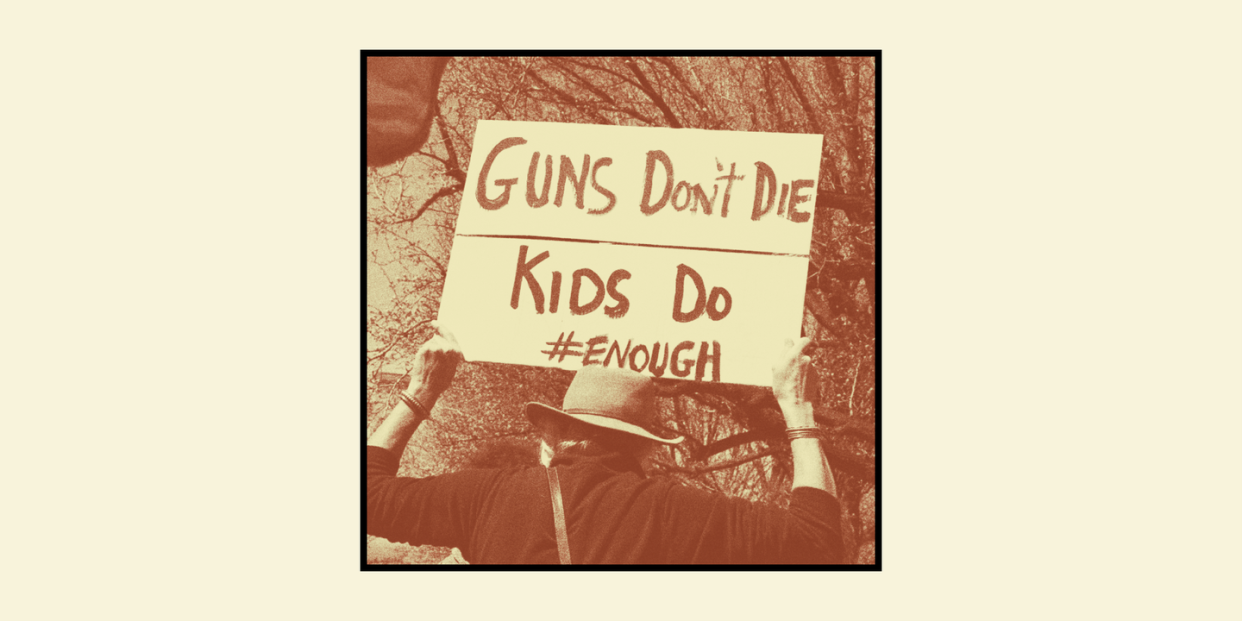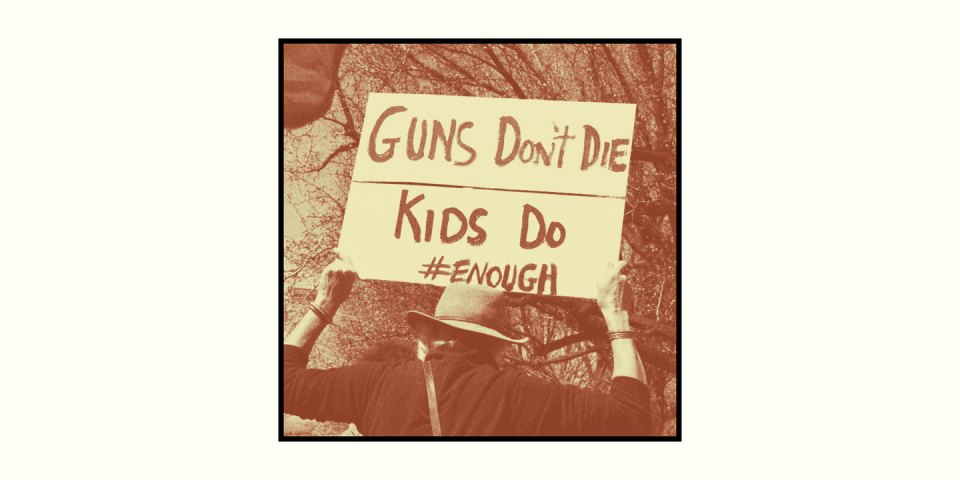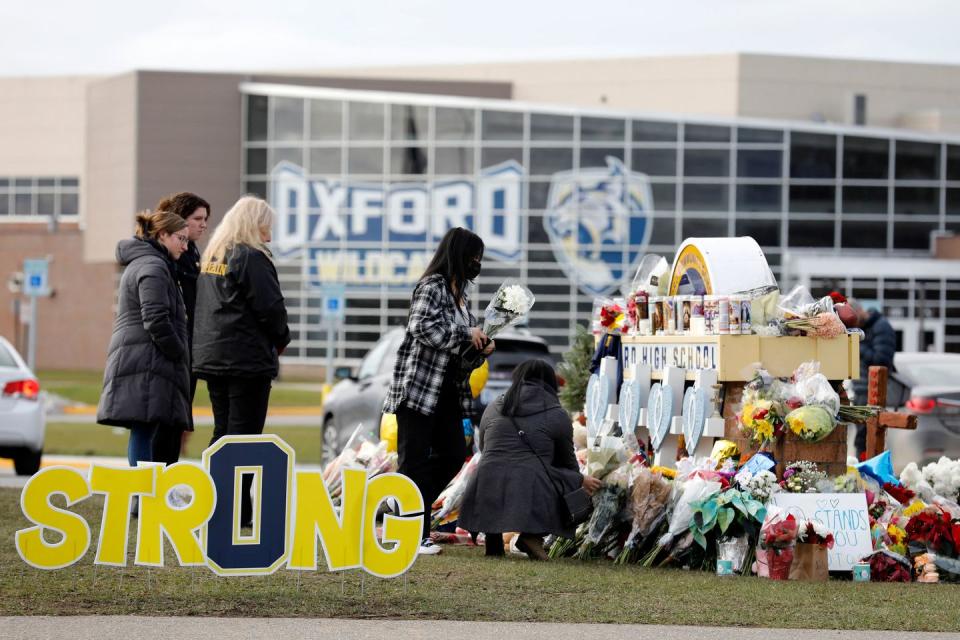There’s a Groundswell of New Candidates Set on Enacting Gun Control


On November 30, 2021, I got a call that I’d been dreading since I heard the local news earlier that day: An editor at The New York Times wanted to know if I could cover a school shooting in Oxford, Michigan, an hour’s drive from my home in Ann Arbor.
When I arrived, I found a small town completely traumatized by gun violence: Teenagers crying hysterically in the school parking lot, parents crumbling into one another’s arms in a café, a steady stream of anguished pedestrians walking down Oxford’s normally charming Main Street.
My husband, Daniel, and I have lived and worked as journalists all over the world for three decades, in far-flung places like Vietnam, Turkey, and Egypt. I have seen more than my fair share of people suffering from oppression, poverty, and human rights abuses. However, no story ever resonated with me more deeply than the one I was now reporting from my home state, at that moment ground zero of the epidemic of gun violence devastating the country.

I quickly saw the reality of a school shooting. The list of victims does not end with those who lost their lives and their family and friends; it includes the entire community.
I thought about the community in Uvalde, Texas last night when I heard the news. I was at a political event when a text popped up on my phone from a fellow journalist. “Do you know there was just another school shooting?” I felt my breath stop as I read a report that 18 elementary school children and one teacher had died. (The death toll has since climbed to 19 children and two staff members, with a 66-year-old woman, presumed to be the shooter's grandmother, in critical condition.) As I stared out the window contemplating the deadliest elementary school shooting since Sandy Hook in 2012, I could only think, We can’t just write condolence letters and send prayers. We have to come together. We have to legislate this issue. Now. Today. We can’t continue this nightmare. And I knew that the decision I'd made just four months ago to put aside my trepidation and personally try to do something about gun violence in our country was the right one.
As I drove back home after two days in Oxford last year, following a gut-wrenching candlelight vigil, I had already begun to wonder if I could do something more than chronicle these troubling issues. Maybe it was time to try and fix them. But how?
Two months later, I had my answer.
In late January 2022, I got a call from my friend Travis, who serves on the local city council, asking me a seemingly random question: “Do you know which district you live in?”
I did not.
To be fair, all districts in every state have recently been redrawn to reflect the latest census results. In the case of Michigan, this is the first time an independent commission drew the lines instead of the state legislature, ending gerrymandering in the state.
“You are now in House District 48,” he informed me. “It’s a highly competitive swing district, one of four in Michigan that could help the Democrats gain back the majority in the House for the first time since 2010.”
“No worries. You have my vote,” I replied, eager to support our Democratic governor, Gretchen Whitmer, in safeguarding reproductive, voting, and LGBTQ rights, given the Republican majority’s repeated attempts to restrict them.
“That is not the ask,” he told me. “We want you to run for state representative in your district.”
Silence.
“Think about it over the weekend,” he said finally, after explaining why he and a group of local politicians believed I was the person who could best win my now highly competitive half-Republican/half-Democratic district. They talked about “name recognition.” My family has lived in Ann Arbor for generations and has been civically engaged in everything from starting a school to serving on the judicial bench for decades, including one cousin who is currently a circuit court judge in my county. They liked my “involvement in the community.” I have sat on many educational boards and been supportive of a number of nonprofits. They also felt I would have “broad appeal.” Many members of my family are Republican, so I would not automatically be associated with one party over the other.
I hung up, stunned. Entering politics had never occurred to me. First of all, I’ve been busy. I have a career and have raised three kids. (I’m still raising them—they may be adults, but two of them temporarily moved in during Covid, bringing some of their friends along.) And I take care of my 88-year-old mother, who lives with us.
Plus, I’ve always worked for an array of publications with strict ethics policies prohibiting journalists from actively participating in politics. Given that I never wrote political opinion pieces, I felt it was fine to dip my toes into a bit of activism, which I’d been doing since returning from Egypt 12 years ago. During the last two presidential elections, I did some door knocking on behalf of Democratic candidates and attended a few rallies, including the march on Washington, D.C., with my family in January 2017. Along with my husband, I have fundraised for Planned Parenthood. But that was the extent of my political engagement.
Once I was asked to run, though, I could see how the skills I honed as a journalist—interviewing all sorts of people, researching every point of view, assessing facts, and expressing my thoughts clearly—would be useful for running in my swing district, given the divisiveness and rancorous debates of today. On top of that, my political concerns were growing. Michigan is one of the states in the country with a “trigger law” that goes into effect if Roe v. Wade is overturned. That law, now being fought in the courts, would make abortion a four-year felony for anyone helping a woman end a pregnancy. It will then be up to the state legislature to codify abortion in Michigan once and for all and make it legal for a woman to choose what happens to her body, an issue I care about deeply.
The Republicans in my state were also attempting to pass all kinds of legislation that would restrict voting, including new voter identification requirements and curbs on absentee ballots. Beyond gun violence, I’m concerned about more mundane issues that affect me and everyone I know. As my mother’s caretaker, I worry about the rising cost of her prescription medication, as well as my children struggling to pay off student debts, and my husband and I being able to afford to retire one day. I was beginning to feel like I had to do something.
A week later, as I was driving through a rural part of the district, taking stock of the landscape dotted with farms and feeling a strange urge to jump out and talk to strangers about their concerns, Travis called to ask if I had made my decision. I pulled the car over and said, “Yes, I will run.” When I hung up, I burst into tears, feeling both elated and terrified.
Now, nearly three months into my campaign to be state representative, I have met hundreds of voters in my district, knocking on doors daily and attending events. I have heard my neighbors’ concerns over contaminants affecting our lakes, rivers, aquifers, and drinking water. We need to hold corporate polluters accountable for the cleanup. I have talked to current state representatives about safe storage legislation for firearms I would back and ways I could help with our district’s many infrastructure needs, from roads and bridges in need of repair to better high-speed internet. I have met with union officials to learn how we might create better-paying jobs with access to affordable, quality healthcare, and with teachers talking about the need for more funding for mental health counselors. In short, I have learned more than I could ever have imagined about policy in the past 10 weeks.
But best of all, even in the more Republican parts of my district, nearly everyone has been polite, and all but one person has taken my literature after I introduce myself as a candidate that wants to end divisiveness.
Winning this district will be challenging, but after meeting more of the people I would represent, and seeing how passionate we all are about these issues, I intend to do it now more than ever.
Clearly, I’m not alone in feeling that we’re at a crisis point in our history, one that’s severe enough to push me out of my comfort zone. As I hit the campaign trail, I’m far from the only first-time candidate out here, and we represent an array of age groups, backgrounds, and life experiences—my fellow state representative candidate one district over is a 19-year-old African American student.
Given the issues on the table, pundits and think tanks speculate that 2022 could be a record-breaking year in terms of the number of women running for office, wanting to protect our right to choose, safeguard the planet for future generations, and support educators who teach the truth about our country’s past. Political action committees like Vote Mama support mothers running for office, and groups like Emily’s List are reaching out to help recruit, mentor, and support women running for all political offices, including important down-ballot races, like mine, that can flip the majority in state Houses back to the Democrats. Across the country, there are women—and men—who made the same choice I did, to run. And it feels great to be doing something that might create change.
My decision, in the end, came down to a simple question. To echo the words of the Rabbi Hillel, famously paraphrased later by the civil rights activist John Lewis, “If not me, then who? If not now, then when?” In 2022, democracy is on the ballot, and we all need to step up in whatever way we can. I never thought I would be doing this, but running for office is my way to help.
You Might Also Like

